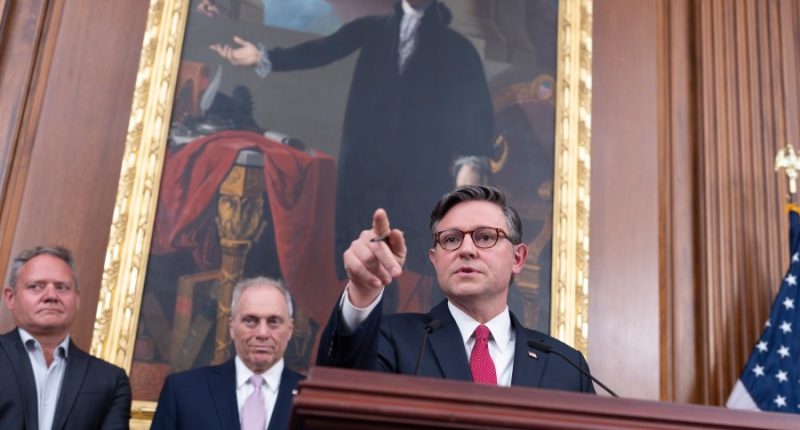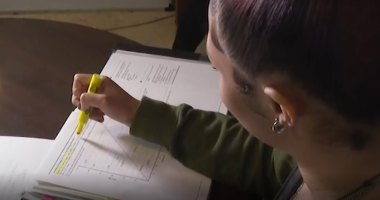Share this @internewscast.com

WASHINGTON (AP) — House Republican leaders are racing toward a Wednesday vote on President Donald Trump’s tax and spending cuts package, eager to capitalize on the momentum from a hard-won Senate vote while effectively challenging members to defy their party’s leader and vote against it.
“The American people gave us a clear mandate, and after four years of Democrat failure, we intend to deliver without delay,” the top four House GOP leaders declared Tuesday after the bill passed the Senate 51-50, thanks to Vice President JD Vance’s tiebreaking vote.
It’s a risky strategy, aimed at fulfilling Trump’s demand for a July 4 finish, and a challenging path lies ahead. Since its inception earlier this year, Republicans have faced significant hurdles with the bill almost every step, often succeeding by just one vote. Their House majority is narrow at 220-212, allowing little room for defections.
Some Republicans are likely to balk at being asked to rubber stamp the Senate bill less than 24 hours after passage, having had little time to read or absorb the changes that were made, many at the last minute to win the vote of Alaska Sen. Lisa Murkowski.
House Republicans from competitive districts have bristled at the Senate bill’s cuts to Medicaid, while conservatives have lambasted the legislation as straying from their fiscal goals.
It falls to Speaker Mike Johnson and his team to convince them that the time for negotiations is over.
Trump pushes Republicans to do ‘the right thing’
The bill would extend and make permanent various individual and business tax breaks that Republicans passed in Trump’s first term, plus temporarily add new ones Trump promised during the campaign, including allowing workers to deduct tips and overtime pay, and provide a new $6,000 deduction for most older adults. In all, the legislation contains about $4.5 trillion in tax cuts over 10 years.
The bill also provides $350 billion for defense and Trump’s immigration crackdown. Republicans partially pay for it all through less spending on Medicaid and food assistance. The Congressional Budget Office projects it will add about $3.3 trillion in federal deficits over the coming decade.
The House passed its version of the bill in May, despite worries about spending cuts and the overall price tag. Now, it’s being asked to give final passage to a version that, in many respects, exacerbates those concerns. The Senate bill’s projected impact on federal deficits, for example, is significantly higher.
Trump praised the bill profusely in a social media post, saying, “We can have all of this right now, but only if the House GOP UNITES, ignores its occasional ‘GRANDSTANDERS’ (You know who you are!), and does the right thing, which is sending this Bill to my desk.”
The high price of opposing Trump’s bill
Speaker Johnson, R-La., is intent on meeting the president’s July 4 timeline. He’s also betting that hesitant Republicans won’t cross Trump because of the heavy political price they would have to pay.
They need only look to Sen. Thom Tillis, R-N.C., who announced his intention to vote against the legislation over the weekend. Soon, the president was calling for a primary challenger to the senator and personally attacking him on social media. Tillis quickly announced he would not seek a third term.
Others could face a similar fate. One House Republican who has staked out opposition to the bill, Rep. Thomas Massie of Kentucky, is already being targeted by Trump’s well-funded political operation.
House Majority Leader Steve Scalise, R-La., said leadership was not entertaining the possibility of making changes to the bill before the final vote. He said the two chambers already agree on the vast majority of what’s in it.
“It’s not as easy as saying, ‘Hey, I just want one more change,’ because one more change could end up being what collapses the entire thing,” Scalise said.
Democratic lawmakers, united against the bill as harmful to the country, condemned the process as rushed. Rep. Jim McGovern, D-Mass., said there’s no real deadline for getting the bill passed by July 4.
“We’re rushing not because the country demands it but because he wants to throw himself another party,” McGovern said. “This isn’t policy. It’s ego management.”
Democrats warn health care, food aid are being ripped away
House Democratic leader Hakeem Jeffries described the bill in dire terms, saying cuts in Medicaid spending would result in “Americans losing their lives because of their inability to access health care coverage.” He said Republicans are “literally ripping the food out of the mouths of children, veterans and seniors.”
“House Democrats are going to do everything we can for the next few hours, today, tomorrow, for the balance of this week and beyond to stop this bill from ever becoming law,” Jeffries said.
Republicans say they are trying to rightsize the safety net programs for the population they were initially designed to serve, mainly pregnant women, the disabled and children, and root out what they describe as waste, fraud and abuse.
The package includes new 80-hour-a-month work requirements for many adults receiving Medicaid and applies existing work requirements in the Supplemental Nutrition Assistance Program, or SNAP, to more beneficiaries. States will also pick up more of the cost for food benefits, with the amount based on their payment error rates, which include underpayments and overpayments.
The driving force behind the bill, however, is the tax cuts. Many expire at the end of this year if Congress doesn’t act.
“Passing this bill means smaller tax bills and bigger paychecks for the American people — permanently,” said Senate Majority Leader John Thune. “It will also help get our economy firing on all cylinders again.”
The Tax Policy Center, which provides nonpartisan analysis of tax and budget policy, projected the bill would result next year in a $150 tax break for the lowest quintile of Americans, a $1,750 tax cut for the middle quintile and a $10,950 tax cut for the top quintile. That’s compared with what they’d face if the 2017 tax cuts expired.















